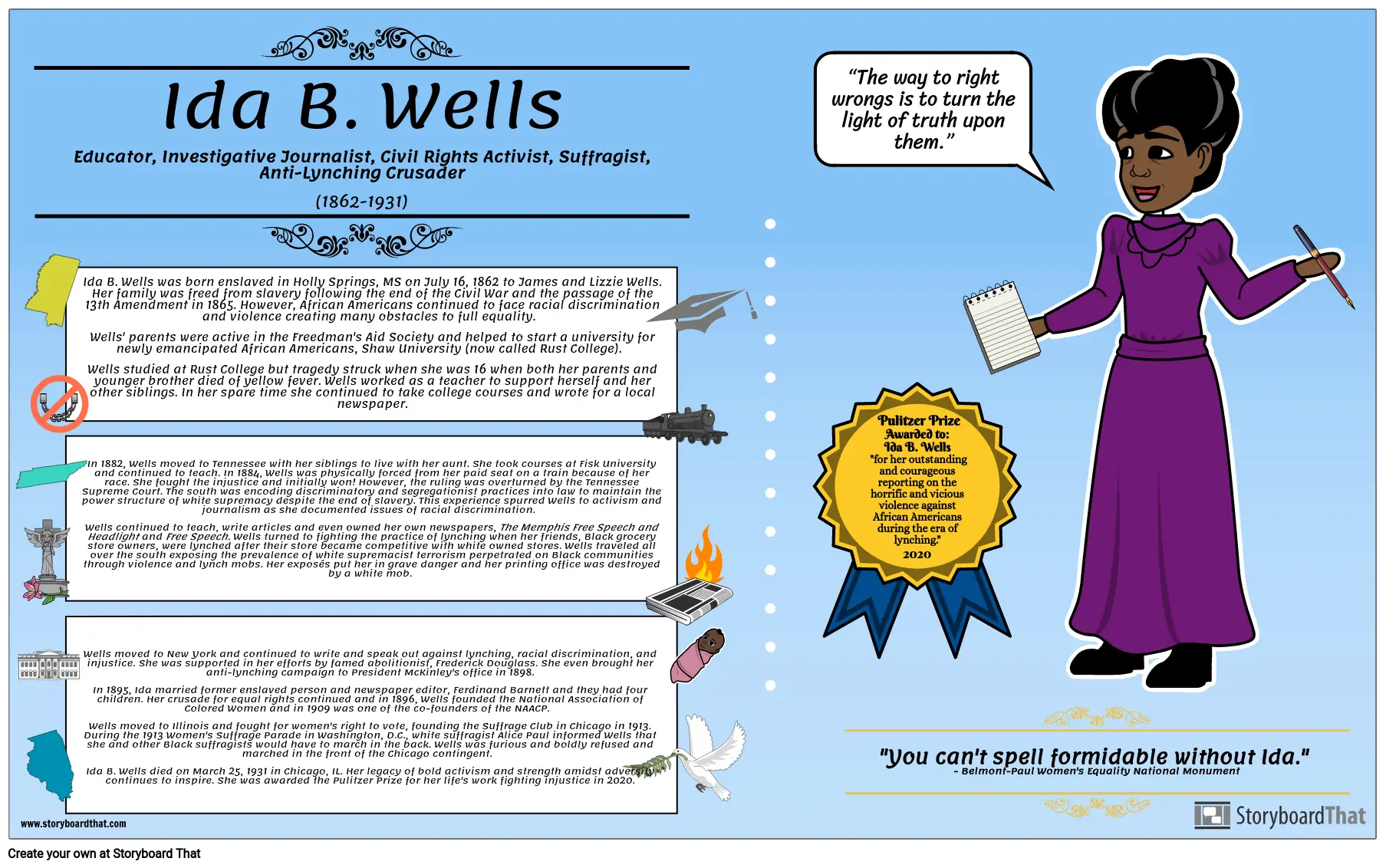Tembeldatud: Rassism, Antirassism ja Sina: Elulooraamat

Süžeeskeem Kirjeldus
Raamatus Stamped on mainitud nii palju ajaloolisi isikuid: rassism, antirassism ja sina. Selles tegevuses saavad õpilased valida ühe inimese, keda edasi uurida, ja luua eluloo plakati. Õpilased uurivad oma isikut ja kirjutavad nende taustast ja peamistest saavutustest. Nad võivad inimese omaduste tähistamiseks kasutada sobivaid märke, sümboleid, esemeid ja stseene.
Süžeeskeem Tekst
- Ida B. WellsEducator, Investigative Journalist, Civil Rights Activist, Suffragist, Anti-Lynching Crusader(1862-1931)
- Wells moved to New York and continued to write and speak out against lynching, racial discrimination, and injustice. She was supported in her efforts by famed abolitionist, Frederick Douglass. She even brought her anti-lynching campaign to President McKinley's office in 1898.In 1895, Ida married former enslaved person and newspaper editor, Ferdinand Barnett and they had four children. Her crusade for equal rights continued and in 1896, Wells founded the National Association of Colored Women and in 1909 was one of the co-founders of the NAACP. Wells moved to Illinois and fought for women's right to vote, founding the Suffrage Club in Chicago in 1913. During the 1913 Women's Suffrage Parade in Washington, D.C., white suffragist Alice Paul informed Wells that she and other Black suffragists would have to march in the back. Wells was furious and boldly refused and marched in the front of the Chicago contingent. Ida B. Wells died on March 25, 1931 in Chicago, IL. Her legacy of bold activism and strength amidst adversity continues to inspire. She was awarded the Pulitzer Prize for her life's work fighting injustice in 2020.
- In 1882, Wells moved to Tennessee with her siblings to live with her aunt. She took courses at Fisk University and continued to teach. In 1884, Wells was physically forced from her paid seat on a train because of her race. She fought the injustice and initially won! However, the ruling was overturned by the Tennessee Supreme Court. The south was encoding discriminatory and segregationist practices into law to maintain the power structure of white supremacy despite the end of slavery. This experience spurred Wells to activism and journalism as she documented issues of racial discrimination. Wells continued to teach, write articles and even owned her own newspapers, The Memphis Free Speech and Headlight and Free Speech. Wells turned to fighting the practice of lynching when her friends, Black grocery store owners, were lynched after their store became competitive with white owned stores. Wells traveled all over the south exposing the prevalence of white supremacist terrorism perpetrated on Black communities through violence and lynch mobs. Her exposés put her in grave danger and her printing office was destroyed by a white mob.
- Ida B. Wells was born enslaved in Holly Springs, MS on July 16, 1862 to James and Lizzie Wells. Her family was freed from slavery following the end of the Civil War and the passage of the 13th Amendment in 1865. However, African Americans continued to face racial discrimination and violence creating many obstacles to full equality. Wells' parents were active in the Freedman's Aid Society and helped to start a university for newly emancipated African Americans, Shaw University (now called Rust College). Wells studied at Rust College but tragedy struck when she was 16 when both her parents and younger brother died of yellow fever. Wells worked as a teacher to support herself and her other siblings. In her spare time she continued to take college courses and wrote for a local newspaper.
- Pulitzer PrizeAwarded to: Ida B. Wells "for her outstanding and courageous reporting on the horrific and vicious violence against African Americans during the era of lynching."2020
- "You can't spell formidable without Ida." - Belmont-Paul Women's Equality National Monument
- “The way to right wrongs is to turn the light of truth upon them.”
Loodud üle 30 miljoni süžeeskeemi
Proovimiseks Pole Vaja Allalaadimist, Krediitkaarti ega Sisselogimist!
